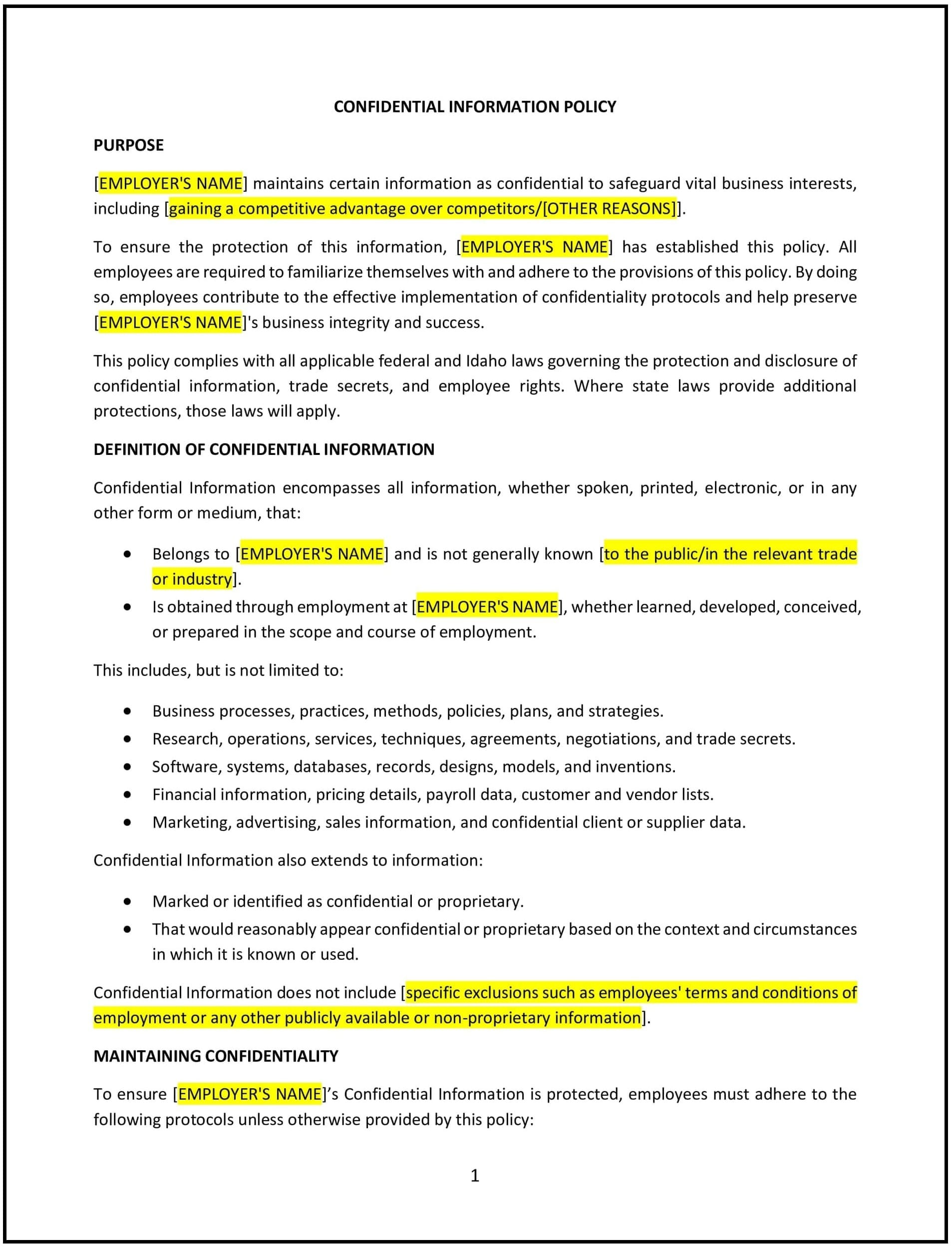Confidential information policy (Idaho): Free template
Got contracts to review? While you're here for policies, let Cobrief make contract review effortless—start your free review now.

Customize this template for free
Confidential information policy (Idaho)
A confidential information policy helps Idaho businesses protect sensitive data, such as trade secrets, customer information, and internal communications. This policy outlines the types of information considered confidential, the responsibilities of employees in safeguarding it, and the consequences of unauthorized disclosure. It reflects the business’s commitment to maintaining trust, security, and competitive advantage.
By implementing this policy, businesses can reduce the risk of data breaches, protect intellectual property, and ensure compliance with privacy standards.
How to use this confidential information policy (Idaho)
- Define confidential information: Specify the types of information considered confidential, such as financial data, customer records, proprietary processes, or employee details.
- Outline employee responsibilities: Provide clear guidelines for handling confidential information, including storage, access, and sharing protocols.
- Establish security measures: Describe the steps employees must take to protect confidential information, such as using strong passwords, encryption, and secure file-sharing tools.
- Address third-party interactions: Provide guidelines for sharing confidential information with vendors, contractors, or partners, including the use of non-disclosure agreements (NDAs).
- Communicate consequences: Clearly state the disciplinary actions for unauthorized disclosure or misuse of confidential information.
- Train employees: Conduct regular training sessions to educate employees on the policy, security best practices, and the importance of safeguarding sensitive data.
- Review and update: Regularly review the policy to ensure it remains aligned with technological advancements, business needs, and Idaho laws.
Benefits of using this confidential information policy (Idaho)
This policy provides numerous benefits for Idaho businesses:
- Protects sensitive data: Clear guidelines help prevent unauthorized access, disclosure, or misuse of confidential information.
- Reduces risk of data breaches: By outlining security measures, businesses can minimize the likelihood of data breaches and associated costs.
- Safeguards intellectual property: The policy helps protect trade secrets, proprietary processes, and other competitive advantages.
- Builds trust with stakeholders: Demonstrating a commitment to data security can enhance trust with customers, partners, and employees.
- Encourages accountability: The policy holds employees accountable for handling confidential information responsibly.
- Aligns with privacy standards: The policy helps businesses meet industry standards and legal requirements for data protection.
- Supports business continuity: Protecting confidential information ensures the business can operate securely and maintain its reputation.
Tips for using this confidential information policy (Idaho)
- Communicate the policy effectively: Share the policy with employees during onboarding, training sessions, and through internal communications to ensure awareness.
- Train employees: Provide training on the policy, security best practices, and the importance of safeguarding confidential information.
- Implement security measures: Ensure employees follow protocols such as using strong passwords, encryption, and secure file-sharing tools.
- Monitor access: Regularly review access logs and permissions to ensure only authorized personnel can access confidential information.
- Document incidents: Maintain records of any breaches or unauthorized disclosures and the steps taken to address them.
- Review the policy regularly: Update the policy as needed to reflect changes in technology, business needs, or Idaho laws.
- Lead by example: Encourage leadership to model responsible handling of confidential information and demonstrate a commitment to the policy’s principles.